
Robert Marvin Hull was a Canadian professional ice hockey player who is widely regarded as one of the greatest players of all time. His blond hair, skating speed, end-to-end rushes, and ability to shoot the puck at very high velocity all earned him the nickname "the Golden Jet". His talents were such that an opposing player was often assigned just to shadow him.

Roller derby is a roller skating contact sport played on an oval track by two teams of five skaters. It is played by approximately 1,250 amateur leagues worldwide, mostly in the United States.
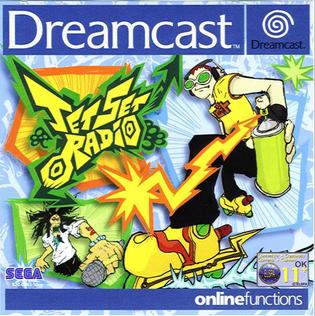
Jet Set Radio is a 2000 action game developed by Smilebit and published by Sega for the Dreamcast. The player controls a member of a youth gang, the GGs, as they use inline skates to traverse Tokyo, spraying graffiti, challenging rival gangs, and evading authorities.
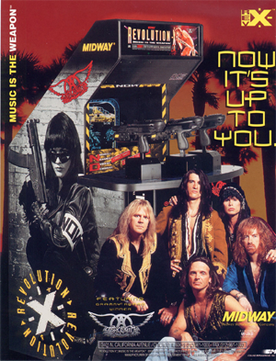
Revolution X is a shooting gallery video game developed by Midway and released in arcades in 1994. The gameplay is similar to Midway's earlier Terminator 2: Judgment Day, but is themed around the band Aerosmith. The oppressive New Order Nation regime and their leader Helga have abducted Aerosmith, and players use a mounted gun to control onscreen crosshairs and shoot enemies. The members of Aerosmith are hidden throughout the game's international locales and must be found in order to receive the game's true ending.

Micro Maniacs is a racing video game developed by Codemasters for PlayStation and Game Boy Color. It is a spin-off to the Micro Machines games, the main difference being that players control tiny characters where a few racetracks feature the use of vehicles. The North American version was sponsored by Fox Kids, and so the game's name was changed there. It was scheduled to be released in June 2000, but was delayed to late September.
The 1972–73 WHA season was the first season of the World Hockey Association (WHA). Twelve teams played 78 games each. The league was officially incorporated in June of 1971 by Gary Davidson and Dennis A. Murphy and promised to ice twelve teams in various markets around Canada and the United States. The league championship trophy, the Avco World Trophy, was donated by AVCO Financial Services Corporation along with $500,000. The New England Whalers won the first Avco World Trophy.
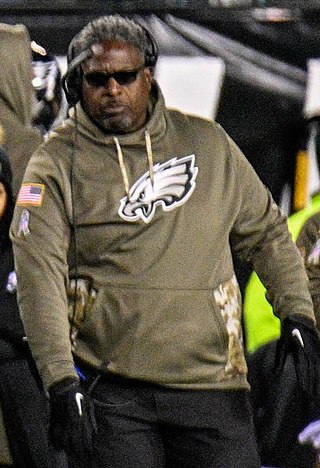
Tracy Quinton Rocker is an American football coach and former player who is the defensive line coach for the Tennessee Titans of the National Football League (NFL). He played as a defensive tackle in the NFL.

RollerGames is a U.S. television series that presented a theatrical version of the sport of roller derby, and featured a number of skaters who had been in the Roller Games league (1961–1975), as well as younger participants. It was broadcast for one season (1989–1990). The series came from the combination of Roller Games owner William Griffiths, Sr. and the television production team of David Sams and Michael Miller. Chet Forte served as the show's director for its entire run. Chuck Underwood served as play-by-play commentator while Sams provided the color commentary. Former TV reporter Shelly Jamison was trackside reporter and Hot Seat host and conservative commentator Wally George hosted halftime segments known as RollerSports Central.

Roller Games was the name of a sports entertainment spectacle created in the early 1960s in Los Angeles, California as a rival to the Jerry Seltzer-owned Roller Derby league, which had enjoyed a monopoly on the sport of roller derby — and its name — since its inception in 1935. Roller Games provided a mostly televised, increasingly theatrical version of the sport. Roller Games and its flagship team, the Los Angeles Thunderbirds (T-Birds) has endured several boom and bust cycles, including a roller derby attendance record in 1972, a major reorganization in 1975, appearances on ESPN in 1986, a TV series called RollerGames in 1989–1990, and a small number of untelevised exhibition matches in 1987, 1988, 1990, 1993, and the early and mid-2000s.
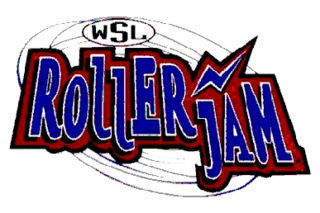
RollerJam is an American television series featuring roller derby that aired on The Nashville Network from 1999 to 2001. It was the first attempt to bring roller derby to TV since RollerGames.
Georgia Ann Siedenberg Hase - also known as "Mizz" Georgia Hase - was best known as a heel manager of two prominent roller games teams, the Detroit Devils of the original Roller Games league and Bad Attitude of the syndicated TV series RollerGames and was recognized as the most controversial figure in the history of the game. She had a longtime bitter feud against the legendary Los Angeles Thunderbirds. It was rumored that she tried out for the T-Birds but never got her shot, so went on to skate for, and later manage, the Devils. She put that rumor to rest in an interview done on the debut edition of RollerShoot on the AVE Radio Network on Blog Talk Radio.
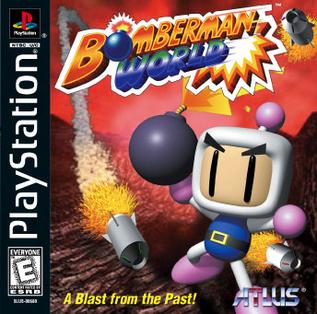
Bomberman World is a maze action video game released in 1998 by Hudson Soft for the PlayStation. It is part of the Bomberman series. The game was also re-released for PCs in 2002 alongside the TurboGrafx-16 version of Bomberman and Bomberman '93 as part of a compilation disc titled Bomberman Collection.

Mighty Morphin Power Rangers: The Movie is the title of four different video game adaptations of the film of the same name which were released for the Super NES, Genesis, Game Boy and Game Gear. While the games are ostensibly based on the film, they also feature characters and plot elements from the second season of the original TV series. Like the previous game versions of the original Mighty Morphin Power Rangers, none of the four versions of the movie game are ports of each other.
Little Fighter 2 is a Hong Kong freeware PC fighting game for Windows and is the sequel to the game Little Fighter. Little Fighter 2 was created by Marti Wong and Starsky Wong in 1999, and received a long series of updates.

Zuma's Revenge! is a 2009 tile-matching puzzle video game developed and published by PopCap Games. It was released for Microsoft Windows and Mac OS X, as a sequel to the earlier 2003 video game, Zuma, and was later ported to Windows Phone.
Hero Fighter (HF) is a beat 'em up game created by Marti Wong, who was one of the designers of Little Fighter and Little Fighter 2. The game is made using flash and is still being actively developed and refined by its creator. It supports up to three players on one computer, and up to four computers on a network game mode, whereby players can challenge each other online.

Skull & Crossbones is a pirate-themed beat 'em up developed by Atari Games and released as an arcade video game in 1989. Developer Tengen ported the game to the Amiga, Amstrad CPC, Atari ST, Commodore 64, MS-DOS, Nintendo Entertainment System, and ZX Spectrum.
SD Gundam G Generation Over World is PSP video game in the SD Gundam G Generation series with an original story as well as the scattered stories mode as in previous games.

Minerva Fabienne Hase is a German pair skater. With her current partner, Nikita Volodin, she is the 2024 World bronze medalalist, the 2023–24 Grand Prix Final champion, a two-time ISU Grand Prix gold medalist and two-time ISU Challenger Series medalist.

Nolan Seegert is a German retired pair skater. With his skating partner, Minerva Fabienne Hase, he was the 2019 Rostelecom Cup bronze medalist, 2021 CS Nebelhorn Trophy champion, and three-time German national champion. The pair represented Germany at the 2022 Winter Olympics.















